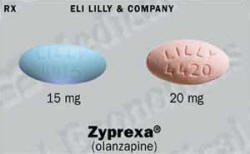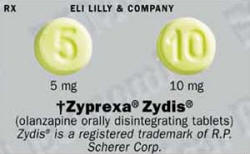Zyprexa (Olanzapine) Patient Information
Find out why Zyprexa (Olanzapine) is prescribed, side effects of Zyprexa, Zyprexa warnings, effects of Zyprexa during pregnancy, more - in plain English.
Generic name: Olanzapine
Brand name: Zyprexa
Pronounced: Zye-PRECKS-ah
Full Zyprexa Prescribing Information
Why is Zyprexa prescribed?
Zyprexa helps manage symptoms of schizophrenia, the manic and mixed phases of bipolar disorder, and other psychotic disorders. Zyprexa may also be used with lithium or valproate for short-term treatment of acute manic episodes of bipolar disorder.
Zyprexa is thought to work by opposing the action of serotonin and dopamine, two of the brain's major chemical messengers. The drug is available as Zyprexa tablets and Zyprexa Zydis, which dissolves rapidly with or without liquid.
Most important fact about Zyprexa
At the start of Zyprexa therapy, the drug can cause extreme low blood pressure, increased heart rate, dizziness, and, in rare cases, a tendency to faint when first standing up. These problems are more likely if you are dehydrated, have heart disease, or take blood pressure medicine. To avoid such problems, your doctor may start with a low dose of Zyprexa and increase the dosage gradually.
How should you take Zyprexa?
Zyprexa should be taken once a day with or without food. To use Zyprexa Zydis, open the sachet, peel back the foil on the blister pack, remove the tablet, and place the entire tablet in the mouth. Do not push the tablet through the foil. The medication can be taken with or without water; the saliva in your mouth will cause the tablet to dissolve.
--If you miss a dose...
Take it as soon as you remember. If it is almost time for your next dose, skip the one you missed and go back to your regular schedule. Do not take 2 doses at once.
--Storage instructions...
Store at room temperature away from light and moisture.
What side effects may occur with Zyprexa?
Side effects cannot be anticipated. If any develop or change in intensity, inform your doctor as soon as possible. Only your doctor can determine if it is safe for you to continue taking Zyprexa.
-
More common side effects of Zyprexa may include: Abdominal pain, abnormal gait, accidental injury, agitation, anxiety, back pain, behavior problems, blood in urine, blurred vision, chest pain, constipation, cough, dehydration, dizziness, drowsiness, dry mouth, extreme low blood pressure, eye problems, feeling of well-being, fever, headache, high blood pressure, hostility, increased appetite, increased cough, indigestion, inflammation of the nasal passages and throat, insomnia, joint pain, movement disorders, muscle rigidity, nausea, nervousness, pain in arms and legs, rapid heartbeat, restlessness, tension, tremor, weakness, weight gain
-
Less common side effects may include: Abnormal dreams, decreased sex drive, dental pain, diabetes, difficulty breathing, emotional instability, eye infection, increased salivation, intentional injury, involuntary movement, joint stiffness, low blood pressure, menstrual irregularities, nasal stuffiness, sleepiness, sore throat, suicide attempts, sweating, swelling of arms and legs, thirst, twitching, urinary problems, vaginal infection, vomiting
-
Rare side effects may include: Abnormal ejaculation, black bowel movements, bleeding, blood clots, bone pain, breast growth in males, breast pain, burping, chills, congestive heart failure, difficulty swallowing, dry eyes, dry skin, ear pain, change in taste sensation, enlarged abdomen, fever, gas, stomach upset, hair loss, hangover feeling, heart attack, inability to control bowel movements, migraine, mouth sores, neck pain, neck rigidity, osteoporosis, pallor, rash, rectal bleeding, rheumatoid arthritis, ringing in the ears, sensitivity to light, stroke, sudden death, swelling of face, swollen gums, yeast infection
Why should Zyprexa not be prescribed?
If Zyprexa gives you an allergic reaction, you cannot take the drug.
Special warnings about Zyprexa
Increased chance of death in elderly persons. Elderly patients treated with atypical antipsychotics, such as Zyprexa, for dementia had a higher chance for death than patients who did not take the medicine. Zyprexa is not approved for dementia.
 Drugs such as Zyprexa sometimes cause a condition called Neuroleptic Malignant Syndrome. Symptoms include high fever, muscle rigidity, irregular pulse or blood pressure, rapid heartbeat, excessive perspiration, and changes in heart rhythm. If these symptoms appear, your doctor will have you stop taking Zyprexa while the condition is under treatment.
Drugs such as Zyprexa sometimes cause a condition called Neuroleptic Malignant Syndrome. Symptoms include high fever, muscle rigidity, irregular pulse or blood pressure, rapid heartbeat, excessive perspiration, and changes in heart rhythm. If these symptoms appear, your doctor will have you stop taking Zyprexa while the condition is under treatment.
There is also a risk of developing tardive dyskinesia, a condition marked by slow, rhythmical, involuntary movements. This problem is more likely to surface in older adults, especially elderly women. When it does, use of Zyprexa is usually stopped.
High blood sugar and diabetes. Patients with diabetes or who have a higher chance for diabetes should have their blood sugar checked often.
 Strokes have happened in older patients treated for mental illness from dementia. Zyprexa is not approved for this use.
Strokes have happened in older patients treated for mental illness from dementia. Zyprexa is not approved for this use.
Zyprexa sometimes causes drowsiness and can impair your judgment, thinking, and motor skills. Use caution while driving and don't operate dangerous machinery until you know how the drug affects you.
Medicines such as Zyprexa can interfere with regulation of the body's temperature. Do not get overheated or become dehydrated while taking Zyprexa. Avoid extreme heat and drink plenty of fluids.
Use Zyprexa with caution if you have any of the following conditions: Alzheimer's disease, Parkinson's disease, trouble swallowing, narrow angle glaucoma (high pressure in the eye), an enlarged prostate, heart irregularities, heart disease, heart failure, liver disease, or a history of heart attack, seizures, or intestinal blockage.
 If you have a child with phenylketonuria (the inability to process phenylalanine, a condition that quickly leads to mental retardation) you should be aware that Zyprexa contains this substance.
If you have a child with phenylketonuria (the inability to process phenylalanine, a condition that quickly leads to mental retardation) you should be aware that Zyprexa contains this substance.
Possible food and drug interactions when taking Zyprexa
Avoid alcohol while taking Zyprexa. The combination can cause a sudden drop in blood pressure.
If Zyprexa is taken with certain other drugs, the effects of either can be increased, decreased, or altered. Ask your doctor before taking any prescription or over-the-counter drugs. It is especially important to check before combining Zyprexa with the following: Blood pressure medications Carbamazepine (Tegretol) Diazepam (Valium) Drugs that boost the effect of dopamine, such as the Parkinson's medications Mirapex, Parlodel, Permax, and Requip Fluvoxamine (Luvox) Levodopa (Larodopa) Omeprazole (Prilosec) Rifampin (Rifadin, Rimactane)
Special information if you are pregnant or breastfeeding
If you are pregnant or plan to become pregnant, inform your doctor immediately. Zyprexa should be used during pregnancy only if absolutely necessary. The drug may appear in breast milk; do not breastfeed while on Zyprexa therapy.
Recommended dosage for Zyprexa
ADULTS
Schizophrenia
The usual starting dose is 5 to 10 milligrams once a day. If you start at the lower dose, after a few days the doctor will increase it to 10. After that, the dosage will be increased no more than once a week, 5 milligrams at a time, up to a maximum of 20 milligrams a day.
Those most likely to start at 5 milligrams are the debilitated, people prone to low blood pressure, and nonsmoking women over 65 (because they tend to have a slow metabolism).
Manic Episodes in Manic-Depression
The usual starting dose is 10 to 15 milligrams once a day. The drug is typically taken for no more than 3 or 4 weeks at a time.
Overdosage of Zyprexa
An overdose of Zyprexa is usually not life-threatening, but fatalities have been reported. If you suspect an overdose, seek medical attention immediately.
- Symptoms of Zyprexa overdose may include: Agitation, drowsiness, rapid or irregular heartbeat, slurred or disrupted speech, stupor.
Overdoses of Zyprexa have also led to breathing difficulties, changes in blood pressure, excessive perspiration, fever, muscle rigidity, cardiac arrest, coma, and convulsions.
APA Reference
Staff, H.
(2009, January 3). Zyprexa (Olanzapine) Patient Information, HealthyPlace. Retrieved
on 2026, March 5 from https://www.healthyplace.com/other-info/psychiatric-medications/zyprexa-olanzapine-patient-information